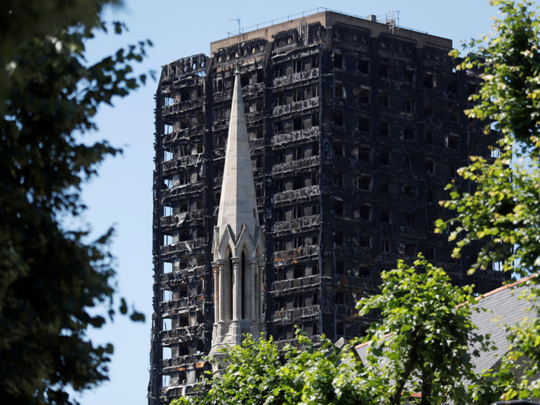
For those of us in the media, the last two years have taught that we all know nothing. The explosion of digital media has filled neither the void left by the decimation of the local newspaper industry in the United Kingdom, nor connected us any more effectively with the “left behind”, the disadvantaged, the excluded. Over this past year, we — me included — mostly London-based media pundits, pollsters and so-called experts, have got it wrong. The Brexit referendum: We got that wrong. Trump defied so-called experts, pundits and journalists alike.
British Prime Minister Theresa May’s strange general election — predicted to get a majority of 60-70: We got that wrong too. The Grenfell Tower disaster taught me a harrowing lesson — that in increasingly fractured Britain, those in the media are comfortably with the elite, with little awareness, contact, or connection with those not of the elite. This completely man-made disaster has proved beyond all other domestic events how little we know, and how dangerous the disconnect is. When journalists woke up that terrible morning and Googled Grenfell Tower, they found a blog published eight months earlier that highlighted the dangers of the building. A chronicle of death foretold not by any journalist, but in a post by Edward Daffarn, the leader of an action group for those who lived in the tower.
The Grenfell residents’ story was out there, published online and shocking in its accuracy. It was hidden in plain sight, but we had stopped looking. The disconnect was complete. Our connectivity — life on Google, Facebook, Twitter and more — has so far failed to combat modern society’s widening disconnection. Amid the demonstrations around the tower after the fire, there were cries of “Where were you? Why didn’t you come here before?” Why didn’t we know? Why didn’t we have contact? Why didn’t we enable the residents of Grenfell Tower — and indeed the other hundreds of towers like it around Britain — to find pathways to talk to us and for us to expose their story? After Grenfell, I felt both disconnected and frustrated.
I felt on the wrong side of the terrible divide that exists in present-day society and in which we, the media, are major players. We can accuse the political classes for their failures, and we do. But we are guilty of them ourselves. How much time had we devoted to social housing in the year since the European Union (EU) referendum, when day after day we found ourselves filling the airwaves with the negotiating positions of May, Boris Johnson, the British Foreign Secretary, David Davis, the Brexit Secretary, Labour party leader Jeremy Corbyn and the rest, before serious negotiations had even begun? I am still haunted too by my own link with what happened at Grenfell Tower.
In April this year, I was involved, alongside Bill Gates, in judging a school’s debating competition in London. I was there to judge the best floor speech. I had little difficulty in deciding — the winner was Firdows Hashim, a remarkably poised, headscarf-wearing 12-year-old from west London. She was confident, and used language beautifully. Two months later, reporting from Grenfell, I spotted a picture of Firdows on a missing poster.
Two weeks ago, it was confirmed that the remains of Firdows and her father had been found in their flat, their identities confirmed using DNA. Firdows has been described as “the most intelligent, wise and eloquent girl”. I was fortunate enough to witness that first-hand, and since then, I often think what she might have become. Could she have prevailed over the fractures in British society, and succeeded? Britain is not alone in this — the organic links within this society are badly broken. In part, this is because the echelons from which our media are drawn do not, for the most part, fully reflect the population among whom we live and to whom we seek to transmit information and ideas.
Grenfell speaks to us all about our own lack of diversity and capacity to reach into the swaths of western society with whom we have no connection. It’s why I want to urge everyone in the media with the power to do it to give the individuals who work with and for you the space to do something, anything, in the wider community we communicate with. We have to widen both our contact with and our awareness of those who live outside and beyond our elite.
There are many difficulties along the way, not least the virtual collapse of local journalism. Britain needs bringing together as never before. And based on what we’ve witnessed over the past year, it remains to be seen if Brexit will be the unifier. Part of the capacity, we have in our hands. The media must reach out, connect and empower. We have to look at the new players in this digital age. Facebook needs to pay more taxes. Google needs to pay more taxes. The rest too. The digital media duopoly has to pay more to carry professional journalism. This cannot last. Governments, the EU and others have to play an even bigger part in forcing them to pay. Yes, we embrace and revel in the digital age. But we cannot let the massive power of its barons devour our local and national sources of information. There are two possibilities. We could end up in a vicious circle, with ever more extreme and partisan sources of information reinforcing people’s prejudices and an ever more vitriolic news feed. It would not only be the reliable dissemination of local news that dies, but national news too. Or we could make a real effort to provide news literacy, to create a society that is finally as concerned with what it reads and views as with what it eats.
— Guardian News & Media Ltd
Jon Snow is a presenter of Channel 4 News.











